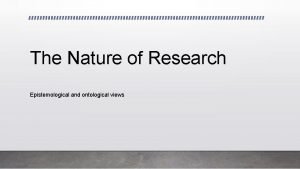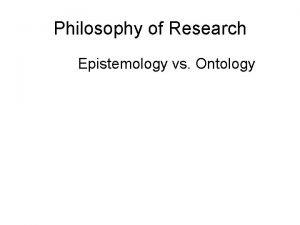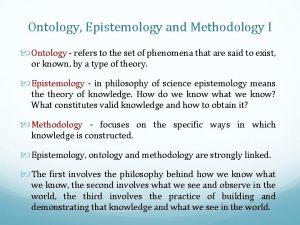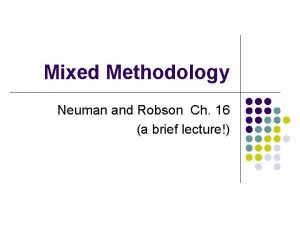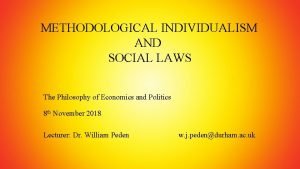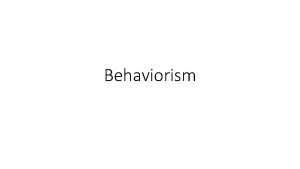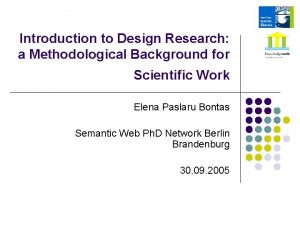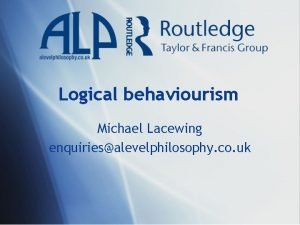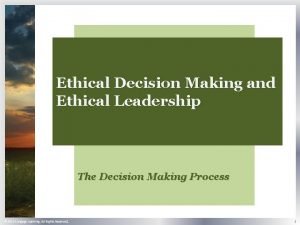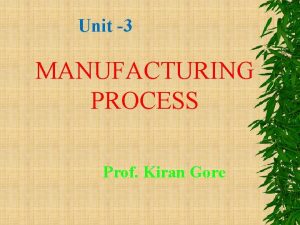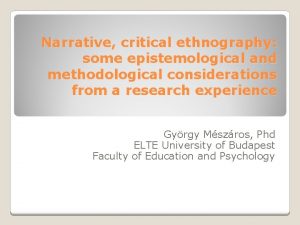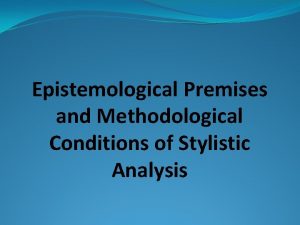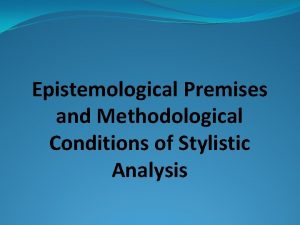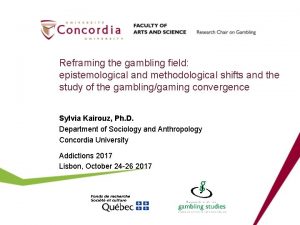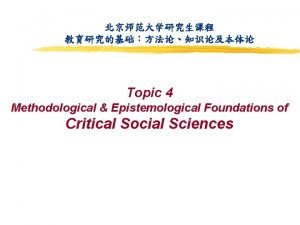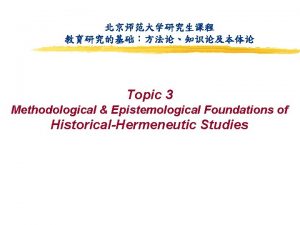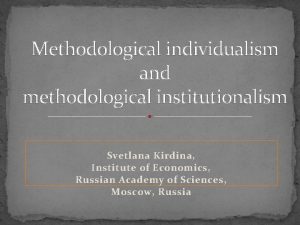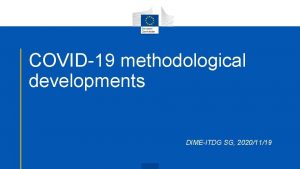Working with oral history epistemological methodological ethical and










- Slides: 10

Working with oral history: epistemological, methodological, ethical and educational LA COLECCIÓN considerations OPENLIVES: LAS MIGRACIONES EN LA ESPAÑA DE LA GUERRA CIVIL Y LA POSTGUERRA Germinal Luis and Miguel Arrebola (University of Portsmouth) in Barcelona. Open. LIVES project (2012). An open collection of research data and teaching materials relating to Spanish migrant stories. JISC SPPO 1180. Skills and Issues in Spanish Portuguese and Latin American Studies University of Leeds Antonio Martínez Arboleda. Open. LIVES project (2012). An open collection of research data and teaching materials relating to Spanish migrant stories. JISC

Objectives • To gain an inshight in oral history as a research method by comparing it with quantitative and qualitative research methods; • To understand the episthemological potential of oral history in relation to traditional history; • To reflect upon the roles of the oral history researchers and oral history users and their relationship with the “informant” and society.

Oral history - research methods • The origins of oral history • Qualitative versus quantitative Video • Since the 1970 s there has been a shift from the expectation that oral history produces information, or ‘data’, to the understanding that oral history gives access to historical subjectivities Penny Summerfield • Implications of that shift: • New way of understanding knowledge construction • New roles for academic researchers and “research participants” • New ethical and practical considerations when doing and presenting oral history

Oral history - research methods Oral history in relation to traditional history: an instrument or a peer academic discipline?

Germinal’s interview Open. LIVES project (2012). An open collection of research data and teaching materials relating to Spanish migrant stories. JISC Questions for you: 1. Under what circumstances would someone reveal that life experience publicly? 2. What do you think about Germinal’s perception of his own past? […] El mayor tendría catorce, Claudio, me acordaré toda la vida porque ese era un gánster. Niños españoles. Y nos pusimos a robar comida en el Puerto de Marsella [Francia], a robar comida y qué hacíamos, cuando estaban descargando los barcos que venían de Argelia, qué se yo, y traían naranjas, dátiles, eso era lo que nos gustaba más a nosotros, otra cosa no nos interesaba, pero de vez en cuando se caía una caja de esto, un guacal, una caja de esas de madera, que tenía dátiles, tremendo, ¡pok! Se rompía y todos los dátiles al suelo, con un polvo, te puedes imaginar el piso de polvo del puerto, grasa y polvo, pues los hombres venían con una escoba de esas que usan los barrenderos y hacían un montón lleno de porquería y nosotros… estábamos como tigres al acecho para caerle encima y yo una cosa, lo pensé después, esos hombres dejaban caer a propósito, sí, eso siempre me ha emocionado [se emociona, llora] yo veía que de verdad no tenía por qué caerse la caja esa. . Germinal Luis’ Interview JISC Open. LIVES Project 2012

Germinal’s interview Answers from you (in the class): Open. LIVES project (2012). An open collection of research data and teaching materials relating to Spanish migrant stories. JISC Questions for you: 1. Under what circumstances would someone reveal that life experience publicly? 2. What do you think about Germinal’s construction of his own past? Question 1 G: Acceptance of the past – G 2: distance – time – perpective S: altruisitic – scientific – educational N: Paid? ? ? H: emotions- story- situation Question 2: Justify his own actions in the whole context of his life – He introduces his own narrative. He introduces effects

Epistemological considerations 1. Life story gives existence and meaning to the past. We live life forward but understand it backwards. 2. Composure: Life story allows the selves to compose their own identity through narrative and achieve a psychic equilibrium. (Summerfield) 3. The story-of-a-life as told to a particular person is in some sense a joint product of the teller and the told. Selves [. . . ] can only be revealed in a transaction between the teller and a told and, as Mishler reminds us, whatever topic one approaches by interviewing must be evaluated in the light of that transaction.

Methodological implications 1. Interview methodology 2. Ethical protocols 3. Analysing the interview 4. Culture, context and

Educational value and values Autonomous Learning Activities - Humanities as Life Learning Socialising knowledge construction Open. LIVES project (2012). An open collection of research data and teaching materials relating to Spanish migrant stories. JISC Democratisation of education: empowering the student and the “informants”: sharing

Attribution and references Pictures from Flickr. com -Dora. Explorer 1 (crystal ball man) -Chris Willis (Close-up Bee) -vancouverfilmschool (students in front -Abhishek Sundaram (Salesman) -denver university (students in café are -Alaska_Dude (people in street show) -daneel ariantho (molecule) -fancyadiamon (diamond) -Ell r brown (cannals network) -Kevinn Doole (people in meetings) -Luis perez (colibri bird) Open. LIVES project (2012). An open collection of research data and teaching materials relating to Spanish migrant stories. JISC This presentation: Antonio Martínez-Arboleda. University of Leeds. Open. LIVES project (2012). An open collection of research data and teaching materials relating to Spanish migrant stories. JISC Academic references: Summerfield, P. . `Oral History’ (online video), Methods@Manchester : Research Methods in the Social Sciences (2011), http: //www. methods. manchester. ac. uk/methods/oralhistory/. Goodson, Ivor F. , Life history research in educational settings : learning from Lives. Buckingham : Open University Press, 2001.
